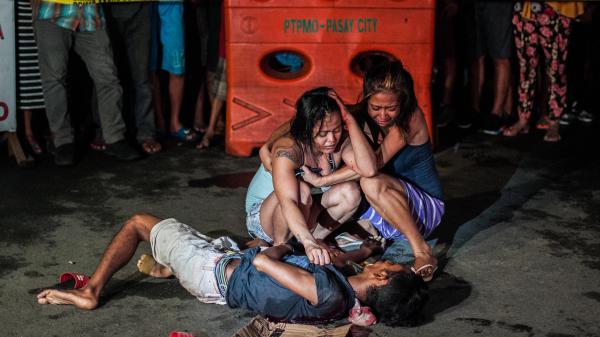Duterte's Violent 'War On Drugs' Finds A Supporter In Trump?
NEW DELHI: Since taking office in June 2016 Philippines’ President Rodrigo Duterte has waged a war against drug dealers and users. Between July 1 to December 12, a total of 5,927 people were killed, as per the reports released by the Philippines National Police.
Out of the 5,927 killings, police killed nearly 2,086 people while the remaining 3,841 were killed extrajudicially or by vigilantes.
President Duterte also vowed to kill ‘Mayors and other officials involved in drug trade’. According to a translation by CNN Philippines, Duterte said: “I would call for the mayors and we would speak privately. I will really tell them: ‘Look for your name in the narco-list ...if your name is there, you have a problem. I will really kill you.’”
Interestingly, a few months back, owing to Washington’s refusal to sell arms to Philippines to aid the ‘war on drugs’ and the criticism from the US on the methods used, Duterte had asked Barack Obama to ‘go to hell’.
However, Duterte has found the much needed support from recently elected President, Donald J. Trump. Following a phone call between the leaders in December, Duterte said that Trump had praised him for his war on drugs. Trump said that Duterte was tackling the issue “the right way”. In the recent Senate hearings, US secretary of state nominee Rex Tillerson refused to condemn Duterte’s war on drugs and the extrajudicial killings in Philippines.
Duterte has also been critical of the church for its opposition since the very beginning of his term. He has recommended a few bishops to try shabu or drugs before criticising his effort to cleanse the nation.
The problem of drug abuse and related legislations and arrests looms over the US too. According to a February 2016 report by the Drug Policy Alliance, the United States imprisons more drug offenders than any other nation in the world. Although rates of drug abuse are similar across all the races, interestingly, it is the black and the latino community which de facto becomes the target in any drug related investigations or arrests.
People of colour experience discrimination at every stage of the judicial system and are more likely to be stopped, searched, arrested, convicted, harshly sentenced and saddled with a lifelong criminal record. According to a Bureau of Justice statistics report, Nearly 80 percent of people in US federal prison and almost 60 percent of people in state prison for drug offences are black or Latino.
A drug conviction often imposes a lifelong ban on many aspects of social, economic and political life which might include denial of child custody, voting rights, employment, business loans, licensing, student aid, public housing and other public assistance to people with criminal convictions.
President Obama, in an interview with the New Yorker, stated that ”We should not be locking up kids or individual users for long stretches of jail time when some of the folks who are writing those laws have probably done the same thing,'' One in nine black children has an incarcerated parent, compared to one in 28 Latino children and one in 57 white children.
The Obama administration had been heavily critical of the methods adapted by Duterte. However, it must be noted that the ‘war on drugs’ originated in the US and it was US president Richard Nixon who initialised in June 1971. It was, however during the Reagan era that the ‘war’ took a violent turn. The Drug Policy Alliance suggests that Jeff Session’s appointment as the Attorney General could bring back militarised, Reagan era war tactics and raids on marijuana businesses.
Lawmakers across the world should look at policy recommendations made by research organisations across the globe. As of January 17, 2017 - 41,930 had been conducted in the Philippines and 45,618 drug personalities arrested. Meanwhile in Project Tokhang - 6,397,626 uses were visited and 1,027,862 have surrendered. Project TokHang refers to the strategy of the police nationwide to go house-to-house in their jurisdictions and convince known drug pushers and users to surrender and change their ways. In the US too, more than $ 51 bn is spent annually on the war of drugs, even though 28 states plus district of Columbia allow the medical use of Marijuana.
1 in 20 people in the world used at least one drug in the year 2014. There has also been nearly 200,000 drug related death in the same year. But does that justify this ‘war on drugs’. Or even the extrajudicial killings on the name of ‘war on drugs’. Most countries, including India have provisions which give drug offenders immunity if they choose to go to rehabilitation centres. However, extrajudicial killings destroy the whole purpose of having such measures in the legislations to be of no use.
Worldwide, 247 million people used drugs in 2014 out of which 29 million suffered from drug use disorders. Sadly, only 1 in 6 people with drug use disorders received treatment. Legitimising extrajudicial killings in the name of ‘war of drugs’ is something that lawmakers across the globe should not perceive to be a fair and just ‘tradeoff’. It has been observed in many instances that there is rampant misuse of power and authority in such cases of extrajudicial killings.
A rehabilitative approach must be taken by the agencies in order to uphold the very idea of democracy. The very root of this problem must be identified and tackled with rather than a merely getting rid of undesirable social elements. If not a policy change, the least a person can expect is a fair and just trial, which is not very likely to happen in the Philippines in the near future at least.





